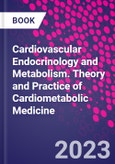Cardiovascular Endocrinology and Metabolism: Theory and Practice of Cardiometabolic Medicine discusses the close intersection between metabolic disorders and cardiovascular disease, covering the basic science and pathophysiology of disease and the latest research in pharmacological approaches and translational therapeutic options. This book is a valuable resource for the vascular and endocrinology clinical and research communities in need of knowledge and potential outcomes.
The global increase in the prevalence of cardiometabolic disorders, and the introduction of therapeutic options for treating metabolic disease that also lower cardiovascular risk, is bringing endocrinologists and cardiologists together in a shared clinical experience.
Please Note: This is an On Demand product, delivery may take up to 11 working days after payment has been received.
Table of Contents
Part 1. Basic science and pathophysiology1. Obesity and insulin resistance
2. Diabetes and macrovascular disease: epidemiology and cardiovascular risk assessment
3. Hypertension
4. Lipid metabolism: role in atherogenesis
5. Renal disease and cardiorenal interactions
6. NAFLD/NASH and cardiovascular risk
7. Heart failure
8. Prothrombosis: association with cardiometabolic disease
9. Inflammation, metabolism and cardiovascular disease
10. Classic endocrine disorders: association with vascular disease
Part 2. Clinical evaluation, lifestyle measures and therapeutic options
11. Non-pharmacological strategies in the prevention and management of cardiometabolic disease
12. Obesity: pharmacological approaches to prevention and management
13. Diabetes: evolution of multifactorial vascular risk reduction
14. Diabetes CVOTS: design, interpretation and future directions
15. Novel glucose-lowering drugs: a new era of cardioprotection and renoprotection
16: Hypertension: pharmacological and surgical management
17. PCSK-9 inhibitors and other novel lipid-modifying drugs
18. Recent therapeutic developments in heart failure
19. Antiplatelet agents
20. Progress in anticoagulant therapy
21. Invasive treatment of atherosclerotic cardiovascular disease: today and tomorrow
22. Cardiometabolic medicine in practice: role of cardiologists vs endocrinologists and the need for a new clinical specialty
Authors
Andrew J. Krentz Visiting Professor, Institute of Cardiovascular and Metabolic Research, University of Reading, UK. Andrew Krentz has four decades of clinical and translational research experience in metabolic, endocrine and related cardiovascular disorders.His expertise in the life sciences includes preclinical and early-phase clinical drug development; he has personally contributed translational medical innovations to endocrinology clinical practice. He is actively involved in projects focused on precision diagnostics and therapeutics, digital healthcare, and healthy longevity that bridge the academic-industry spaces.
Beyond his expertise in diabetes and endocrinology, he is accredited as a clinical specialist by the European Society for Hypertension and is a member of the Medical, Scientific & Research Committee of Heart UK. He is President-Elect of the Vascular, Lipid & Metabolism section of the Royal Society of Medicine as well as being a member of the European Group for the Study of Insulin Resistance (EGIR) and the Diabetes & Cardiovascular Study Group of the European Association for the Study of Diabetes (EASD).
He has authored more than 200 scientific publications and founded the journal Cardiovascular Endocrinology & Metabolism and serves as Editor-in-Chief. Robert J. Chilton Professor, Department of Medicine, Division of Cardiology, University of Texas, San Antonio, USA. Robert J. Chilton, DO, is a Clinical Professor of Medicine, Director of the Cardiac Catheterization Laboratory at University Hospital and the Audie L. Murphy VA Hospital, and Associate Program Director of the Interventional Cardiology Fellowship Program.
A fellow of the American College of Cardiology, American College of Physicians, American College of Osteopathic Internists, and American Heart Association, Dr. Chilton also chairs the Electrophysiology Board Examination for the American Osteopathic Association and presides over the San Antonio chapters of both the Cardiovascular Society and American Heart Association.
Over the past 20 years, Dr. Chilton has authored numerous articles, book chapters, abstracts, and presentations on cardiology. He has developed educational materials and has lectured widely, garnering several awards for his academic contributions, including 1994 Outstanding Teacher from the UT San Antonio.








